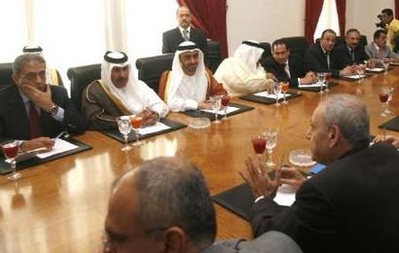 The security outlook in Lebanon continued to improve on Wednesday, amid a tumultuous political situation and a whirlwind of mediation efforts. Southeast of Beirut, the Lebanese Aarmed Forces (LAF) detonated unexploded hand grenades in Choueifat as part of a deployment to the Aley and Chouf districts, which were the scene of intense clashes over the weekend between Progressive Socialist Party and opposition fighters. The Zahle district in the central Bekaa region also saw a relative return to normalcy, with the reopening of several roads shut off last week by government supporters. Despite clashes and reports of brutality in Tripoli during the past few days, a security source told The Daily Star that the security outlook in and around the Northern port city has improved markedly, with LAF deployments resulting in a citywide clamp-down on violence. An overnight explosion was reported, but it appears that this was due to an overloaded electricity generator. In a measure aimed at easing the burden of citizens affected by the violence, the Internal Security Forces released a statement Tuesday announcing that "all ISF bureaus and stations" will be open for the airing of complaints and assuring citizens that "appropriate and necessary measures will be taken to mitigate any existing difficulties." In other security-related news, the LAF’s commander, General Michel Suleiman, met with US Charge d’Affaires to Lebanon Michele Sison and a US Central Command (CENTCOM) delegation headed by acting CENTCOM commander Lieutenant General Martin E. Dempsey in order to discuss a possible shoring up of the Lebanese military’s capabilities.
The security outlook in Lebanon continued to improve on Wednesday, amid a tumultuous political situation and a whirlwind of mediation efforts. Southeast of Beirut, the Lebanese Aarmed Forces (LAF) detonated unexploded hand grenades in Choueifat as part of a deployment to the Aley and Chouf districts, which were the scene of intense clashes over the weekend between Progressive Socialist Party and opposition fighters. The Zahle district in the central Bekaa region also saw a relative return to normalcy, with the reopening of several roads shut off last week by government supporters. Despite clashes and reports of brutality in Tripoli during the past few days, a security source told The Daily Star that the security outlook in and around the Northern port city has improved markedly, with LAF deployments resulting in a citywide clamp-down on violence. An overnight explosion was reported, but it appears that this was due to an overloaded electricity generator. In a measure aimed at easing the burden of citizens affected by the violence, the Internal Security Forces released a statement Tuesday announcing that "all ISF bureaus and stations" will be open for the airing of complaints and assuring citizens that "appropriate and necessary measures will be taken to mitigate any existing difficulties." In other security-related news, the LAF’s commander, General Michel Suleiman, met with US Charge d’Affaires to Lebanon Michele Sison and a US Central Command (CENTCOM) delegation headed by acting CENTCOM commander Lieutenant General Martin E. Dempsey in order to discuss a possible shoring up of the Lebanese military’s capabilities.
–An Arab League delegation late Wednesday continued talks with Lebanese rivals in a bid to reach a settlement to deadly sectarian clashes that have driven Lebanon close to civil war. "The delegation is continuing its talks with the Lebanese rivals with optimism," a member close to the Arab delegation told Deutsche Press-Agentur dpa. The team, headed by Qatari Prime Minister and Foreign Minister Sheikh Hamad bin Jassem al-Thani and Arab League Secretary General Amr Mussa, held talks with Lebanon’s House Speaker Nabih Berri, premier Fouad Seniora, Druze leader Walid Jumblatt, Opposition leader Michela Aoun, Lebanese Armed Forces chief General Michel Suleiman, Majority Leader Saad Hariri, former president Amin Gemayel and Lebanese forces’ leader Samir Geagea. The delegation had issued no statements since their arrival in Beirut. By late evening, there was no apparent breakthrough as the cabinet of Prime Minister Fuad Siniora gathered to decide on the next step. Several officials close to the majority and the opposition said the government would likely cancel measures against Hezbollah on Thursday as part of a "package deal" following further meetings. "The government is unlikely to announce any decisions tonight," one official told AFP. "It will probably do so tomorrow as part of a package deal," he added, without elaborating. The cabinet decided to agree on the suggestion of the army commander… which includes the cancellation of the two decisions," the statement, read by Information Minister Ghazi al-Aridi, said. It is also a first step towards easing the broader standoff between Siniora’s government and opposition forces that has left Lebanon without a president since November.
Meanwhile, sources close to Berri told The Daily Star that he told the Arab delegation that the opposition was not trying to realize any political gains from the recent clashes in the country. The sources added that Berri did not mind holding talks between rival leaders in Doha. Later on Wednesday, Gemayel said after meeting the Arab delegation at his residence in Sin al-Fil that the first item on the agenda of any dialogue should be Hizbullah’s arsenal. "We welcome Sheikh Hamad’s proposal to hold dialogue in Doha," Gemayel said. But "before taking part in any dialogue, we need guarantees after Hizbullah’s using of its arms against other Lebanese parties." "People are worried as a result of Hizbullah’s actions and we need reassurances," he added. "What Hizbullah did left a big bruise in the hearts of many people … A great effort should be made to heal this bruise." Meanwhile, Aoun said after meeting the delegation at his residence in Rabieh that he will not spare any effort to facilitate the success of the Arab mission. "I also hope that other parties do all that is necessary to help the Arab delegation," he said. "The current circumstances are very tough and could be even tougher unless some concessions are made." Aoun blamed the recent escalation on the government. "We have been warning against such behavior for three years," the former army commander said. "A new approach in rule should be adopted." After meeting Aoun, the delegation headed to meet Geagea at his residence in Zouk Mosbeh. Geagea said after the meeting that any talks between the rival parties should tackle two issues: Hizbullah’s relations with the Lebanese state and a new electoral law for the 2009 parliamentary elections. He said that although he did not mind holding dialogue in Doha, he preferred holding the talks in Lebanon: "I appreciate what our Qatari brothers are doing, but I personally prefer inter-Lebanese dialogue in Lebanon." Geagea also said that the government did not need to cancel its decisions regarding the airport security chief and Hizbullah’s private telecommunications network. "The government has referred the decisions to the army, which in turn is in charge of tackling this issue," he said before the moves were rescinded. Wael Abu Faour, a parliamentarian in the ruling coalition, told Reuters after Siniora met the Arab mediators ."The general direction of the Lebanese government is … to put civil peace above all else, including the latest (cabinet) decisions,"
Lebanon has been largely calm for two days and Hezbollah activists removed some roadblocks on the airport road on Wednesday to give the Arab mediators passage to the city . In what they described as a reciprocal move, pro-government Sunni forces partially lifted their border blockade on the main road link between Beirut and Damascus. Syria threw its weight behind the mediation effort on Wednesday. A foreign ministry statement in Damascus urged all Lebanese parties to cooperate constructively with its proposals. If it succeeds in easing tension, the delegation is expected to invite the rival leaders to Qatar for talks aimed at resolving their protracted political conflict. Another political source, speaking before the talks, said the pro-government leaders wanted guarantees Hezbollah would pull out of the streets and vow not to use its guns against its foes before any dialogue. The recent fighting raised concerns Lebanon was edging towards wider civil strife among Druze and Sunni supporters of the governing coalition and Shi’ites who back Hezbollah. Saudi Arabia, a backer of the governing coalition, has said Hezbollah’s actions, if backed by Iran, could threaten Tehran’s ties with Arab states. Iran has blamed the United States for the violence in Lebanon. No commercial flights have been scheduled from the country’s only international airport for the seventh straight day, an airport official said.
U.S. President George W. Bush, in Jerusalem to celebrate the anniversary of Israel‘s founding in 1948, accused Iran on Wednesday of using the Islamist Shi’ite Hezbollah to destabilize Lebanon. He said: "This is an Iranian effort to destabilize their young democracy." He said the United States stood by Lebanon, a parliamentary democracy since independence from France in 1943. Iran has rejected accusations from Washington that it is meddling in Lebanon and has blamed the violence on the United States and Israel. "Iran is the only country not interfering in Lebanon," President Mahmoud Ahmadinejad said on Tuesday. Lt. Gen. Martin Dempsey, the acting commander of U.S. Central Command, spent Wednesday in Beirut, Lebanon, to discuss the security crisis with officials there and assure them that U.S. military aid will continue, a U.S. military official said. He met Defense Minister Elias Murr and Lt. Gen. Michel Suleiman, the commander of the Lebanese armed forces in the wake of the Lebanese government losing control of part of its capital to the militant group Hezbollah. The trip had not previously been scheduled. It is not clear when it was added to the agenda of the top U.S. military commander for the region. Discussions centered on continued U.S. military assistance to the Lebanese armed forces in light of the ongoing crisis. "The U.S. government will continue to support the legitimate institutions of the Lebanese government and the Lebanese people as they seek to preserve their independence and security," the military official said. For the last several years, the Defense Department has supplied Lebanese armed forces with ammunition, armored vehicles and weapons.
Lebanon’s cabinet is likely to cancel measures on Wednesday that angered Hezbollah movement and triggered the worst internal conflict since the country’s civil war, political sources said. You can say it’s a done deal, but we’re waiting for the cabinet meeting," one political source said shortly before Prime Minister Fouad Siniora, who is supported by the United States, convened his ministers for talks at 11:30 a.m. EDT. Rescinding a ban on Hezbollah‘s communications network and the sacking of Beirut airport‘s security chief, who is close to the group, is one of Hezbollah’s demands to lift its blockade of the airport and its campaign of civil disobedience. It would also be a first step towards easing a broader 18-month-long standoff between Siniora’s government and opposition forces that has left Lebanon without a president since November. At least 81 people have been killed since violence broke out on May 7 following the cabinet decisions against Hezbollah.
Please click read more for more pictures
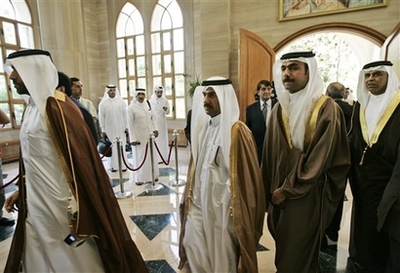
Unidentified members of the Arab League delegation arrive to meet with Lebanon‘s Parliament Speaker Nabih Berri in Beirut, Lebanon, Wednesday May 14, 2008. An uneasy calm has descended on Beirut and other areas of Lebanon as the high-powered Arab League delegation arrived Wednesday to help mediate an end to street confrontations between factions that have claimed more than 50 lives. (AP Photo/Lefteris Pitarakis)
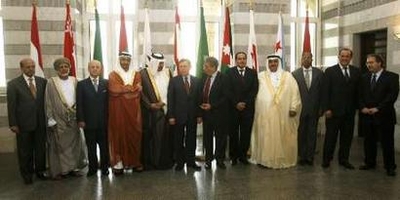
Arab League delegation pose with Lebanese Prime Minister Fouad Siniora (C) for photographers in the government palace in Beirut May 14, 2008. A high-level Arab League delegation began a mediation mission in Beirut on Wednesday to try to pull Lebanon back from the brink of civil war. REUTERS/Mohamed Aazakir (LEBANON
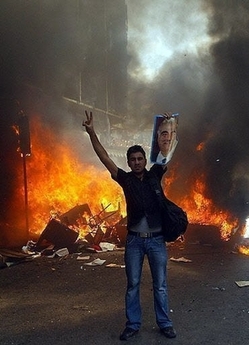
Smoke billows as a Lebanese pro-government supporter flashes the victory sign and holds a poster of assassinated former premier Rafiq Hariri in the northern city of Tripoli. US President George W. Bush has reaffirmed his support for Lebanon‘s elected government against the Iranian-backed Hezbollah militia and for Israel against the Hamas movement.(AFP/File)
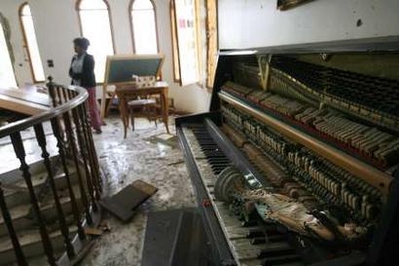
A figurine is seen on a piano damaged in a rocket attack during recent clashes in Shwayfat area in Mount Lebanon near Beirut May 14, 2008. Lebanon‘s cabinet was expected on Wednesday to cancel measures it took against Hezbollah that triggered fighting during . REUTERS/Damir Sagolj (LEBANON)
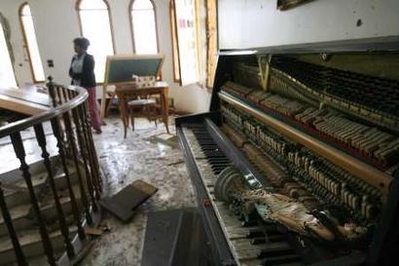
A sand barricade on the road leading to Beirut international airport. An Arab League delegation was due in Beirut to meet with rival leaders in a bid to mediate a settlement to deadly sectarian gunbattles that have driven Lebanon close to civil war.(AFP/Anwar Amro)
AFP via Yahoo! News – 1 hour, 28 minutes ago
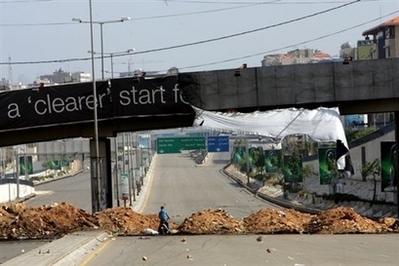
Lebanese men carry a coffin during a funeral in Shwafayt, southeast of Beirut. An Arab League delegation was due in Beirut to meet with rival leaders in a bid to mediate a settlement to deadly sectarian gunbattles that have driven Lebanon close to civil war.(AFP/Patrick Baz)
AFP via Yahoo! News – 1 hour, 28 minutes ago
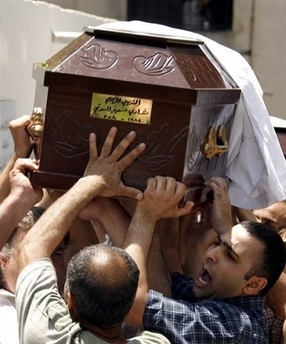
Lebanese troops redeploy in Tripoli. An Arab League delegation was due in Beirut to meet with rival leaders in a bid to mediate a settlement to deadly sectarian gunbattles that have driven Lebanon close to civil war.(AFP/Ramzi Haidar)
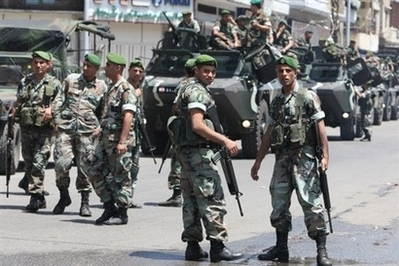
A Lebanese army soldier patrols in front of a war-shattered building at the former "Green Line" in central Beirut May 14, 2008. A high-level Arab League delegation began a mediation mission in Beirut on Wednesday to try to pull Lebanon back from the brink of civil war. REUTERS/Damir Sagolj (LEBANON)
Reuters via Yahoo! News – 2 hours, 34 minutes ago
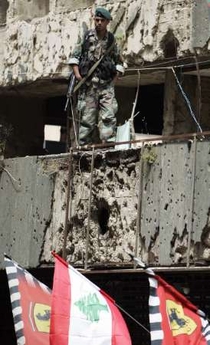
A Lebanese army soldier patrols in front of a war-torn building at the former "Green Line" in central Beirut May 14, 2008.
for more pictures of day 7 please click here



